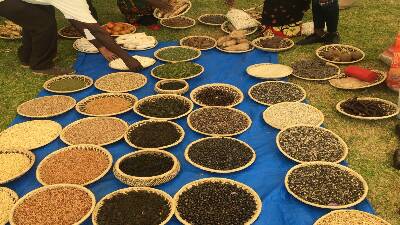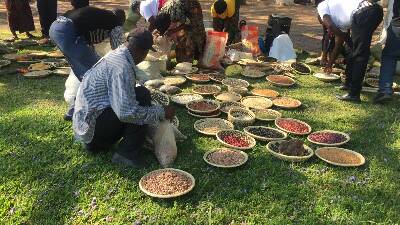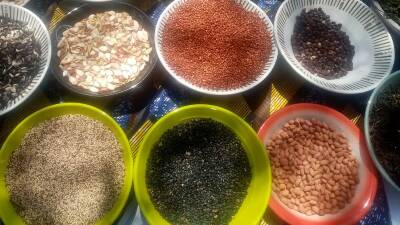Ecuador civil society lead the way in protecting peasant seed systems
Ecuador’s new constitution in 2008 established ecosystem rights, including declaring the country free of genetically modified (GM) crops but a 2017 law undermined this, paving the way for research on transgenic seeds and restrictions on the free circulation of peasant seeds. In January 2022, after years of court battles, the Transgenic Free Ecuador Collective, which included FIAN Ecuador, defeated the law, strengthening constitutional protections against GM seeds and crops.
The highly contested Organic Law on Agrobiodiversity, Seeds and Promotion of Sustainable Agriculture was published in 2017. In the same year, the Transgenic Free Ecuador Collective was formed to fight for greater protection against GM crops, mainly soy and to demand for the protection and free cultivation of peasant seeds.
A 2019 favourable court ruling against the controversial law was not implemented and FIAN Ecuador and other organisations faced multiple threats and harassment due to their advocacy work.
In January 2022, after years of protest and court battles, the Transgenic-Free Ecuador Collective won their court case, strengthening constitutional measures on GM seeds and crops.
Interview with Ana Lucia Bravo, from the Transgenic-Free Ecuador Collective:
Why is this case significant?
In Ecuador, seeds are protected by the constitution thanks to the work of social, indigenous, peasant and other civil society organizations that were facing the introduction of transgenics and the neoliberalization of agriculture.
What we tried to do was to guarantee the free circulation of peasant seeds without being hindered by intellectual property and commercial seed rules. We saw clear and latent threats to limit the free circulation and use of seeds, as well as the criminalization of people who use peasant seeds. So, that was our idea with the constitutional change.
Unfortunately, regulations to build food sovereignty were not implemented. In fact there was backsliding. One of the most worrying things was the approval of a law on biodiversity, seeds and promotion of sustainable agriculture, which included prohibitions on the free circulation of seeds. It required, for example, that seeds go through phytosanitary processes to be marketed.
Authorities were also establishing a single seed market for certified seeds with state subsidies as seen throughout Latin America, as well as allowing the introduction of transgenic seeds. This law was changing all the work we had done in defense of seeds and food sovereignty.
So the Transgenic-Free Ecuador Collective was formed and several unconstitutionality lawsuits were filed against the law. We asked to maintain Ecuador's status as a GMO-free country and for authorities to respect the constitutional provisions on seeds, that is to say that there are no limits to their circulation in the country and that traditional knowledge is recognized.
Six lawsuits were presented and we organised our advocacy towards Ecuador’s consitutional court with sit-ins for the four year duration of case, until we won it in January.
What did this latest ruling achieve?
We see this ruling as a victory because in the first place it recognizes that Ecuador is a country free of GMOs, of GM crops and seeds. This allows us to expand the horizons of food sovereignty without these risks or dangers.
There is now an obligation on the state to promote two types of systems: if the state is going to promote and subsidize seeds, it must have programs for both certified seeds and peasant seeds. Before, what the state did was simply promote a single model – the agro-industrial model:
What does it mean in practice for peasants rights to share seeds?
Now peasant seeds can be advertised and therefore marketed without registration. So, in this way we return to the fact that seeds are free and can circulate without the need for certification. The judgement is very clear and there are two seed systems: peasant seeds, of the communities, and industrial seeds. So it is the industrial seeds that must have this certification process, they must comply with the standards and they must also be advertised according to those standards. Peasant seeds, on the contrary, do not need to comply with this certification process in order to be advertised.
Another important point is that the law recognized as quality seeds only those seeds that have been endorsed by a laboratory. In this case the court says that this is wrong because in the long run, in a plurinational and pluricultural state, all the traditional knowledge, wisdom and practices of the peoples in relation to the use and conservation of seeds are being omitted. The court removed this limitation and recognized the quality of seeds with traditional knowledge, ancestral practices and management of peoples and communities. In this way we are returning the seed to where it belongs, to the people.
And the last thing that the law does, which is also important, is to recognize food sovereignty as a right and shows it as such, although it is not established as a right in the constitution, this sentence talks about the right to food sovereignty, the right and capacity that all Ecuadorian women and men have to produce our own food and also to choose what we eat.
What’s next?
We hope to strengthen all the practices, the seed exchange organizations, the fairs, the knowledge.
There are many experiences in this country and our call is for this to multiply, to keep the seeds in the hands of the people, and to ensure we have our own seeds to produce our own food.
How? Is the 2017 law declared unconstituional and therefore void? It is not mentioned in the Spanish version either. If we cannot find out, fine, no worries
Was Ecuador officially GMO free before that law in 2019 or were these lawsuits to enforce the change of law? Can you change thus line to clarify that?






